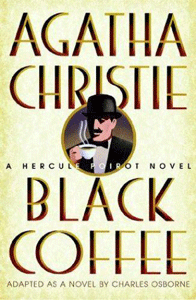Charles Osborne, who acted in this very play in 1956 and went on to become an opera critic, transfers Agatha Christie’s 1930 play “Black Coffee” to novel form in 1998. This novelization doesn’t add much; it’s essentially a translation from the language of “stage play” to the language of “novel.” Simply put: It makes it easier for novel readers to enjoy the story in their preferred format.
Respectful of Christie’s work
It’s a respectful approach, and the correct one. After all, Christie wrote “Black Coffee” with the stage in mind. If she wanted to turn it into a prose story, she would’ve done so, as she did with “The Mousetrap” (a 1947 radio play turned into a 1950 short story).
“Black Coffee” was Christie’s first effort in this medium – a reaction to her disappointment in someone else’s adaptation of “The Murder of Roger Ackroyd” — but you’d never guess it.

“Black Coffee” (1998)
Author: Charles Osborne, novelizing Agatha Christie’s 1930 stage play
Genre: Mystery
Series: Hercule Poirot No. 6
Setting: Abbot’s Cleve, England, 1934
She draws upon the tropes she had established in a decade of novels, including broad interplay between orderly Poirot and put-upon Hastings that would effortlessly amuse theater-goers. (Hastings, married at this point in the timeline – the 1930s – falls under the sway of a pretty young woman to a degree that’s almost scandalous for the era.)
Christie keeps it simple — a murder within a family, and within a single room – which is perfect for the stage. Aside from an opening scene in Poirot’s flat and brief scenes in a garden, “Black Coffee” takes place in the library, allowing stagehands to set up a single set except for those minor exceptions.
Rich family patriarch Sir Claud Amory is murdered, and family members – plus Italian houseguest Dr. Carelli (whom Osborne played in 1956) – are suspects in that killing and the theft of valuable scientific formula papers from the safe.
Story is like a moving train
As a novelization that’s not trying to be a true novel, “Black Coffee” reads differently from what we’re used to. Each chapter picks up directly from the end of the previous one; we don’t alternate between multiple threads.
The paperback in my collection is 272 pages in fairly large print. It could be read in one sitting if you have the opportunity. If you set it aside for a while, it’s challenging to get back into the flow – like hopping onto a moving train rather than one that stops to pick you up.
Even though “Black Coffee” is written for the stage, it’s not contrived for the stage. It makes sense that all the action takes place in the library. Once Poirot and Hastings arrive on the scene, one of them must stay in the library at all times, otherwise the culprit could return to fetch the formula – stashed somewhere the night before — and scamper away.

I appreciate that Osborne (who went on to adapt “The Unexpected Guest” and “Spider’s Web”) doesn’t try to mimic Christie by adding a lot of new material. But I will admit I missed Christie’s sidebar writing. That stuff is the spice of a Christie novel, providing quirky characters and timely themes. This yarn doesn’t rise above an exercise in sharp plotting.
(In one piece of new information, Osborne sets this tale in May 1934. He also says 1927’s “The Big Four” was Poirot’s previous case. That doesn’t compute, and it also might’ve made more sense if Hastings was single at this point, rather than married to Cinderella and living in South America.)
Vintage Poirot and Hastings
To build off the “spice” metaphor, “Black Coffee” is a case of meat and potatoes. It’s a hearty one, allowing actors the space they need to portray Poirot and Hastings. Excellent stage drama comes when the lights go out and the audience (and Poirot, who has just arrived on the scene) must listen to the clues (a dropped piece of metal, a tearing sound, a woman’s scream).
In a great climax, Poirot himself acts out a “staged” battle of wits with the perpetrator, who had already killed one person via poison. As with Hastings’ preoccupation with a pretty woman, the way Poirot draws out the murderer is less subtle than you’d find in a traditional Christie novel. On the stage, Christie goes bigger.
Considering how smoothly Christie takes to this medium, it’s amazing that “Black Coffee” was initially rejected by her agent. Cooler heads prevailed and it was embraced by English troupes and theater-goers.
It has been popular ever since. I saw it myself in 2013 at the Lyceum Theatre in mid-Missouri when I was the arts critic for the Sedalia Democrat. Even though I wasn’t on a Christie kick at the time, I recall being engrossed by the brisk pacing and layered-but-accessible mystery.
Osborne brings that feeling back, as much as he can, in book form. “Black Coffee” is still best enjoyed as a stage play, as was intended. But this novelization is certainly a welcome addition to any Christie bookshelf.
Sleuthing Sunday reviews an Agatha Christie book or adaptation. Click here to visit our Agatha Christie Zone.

